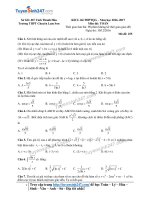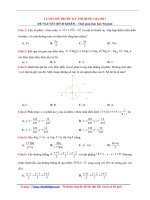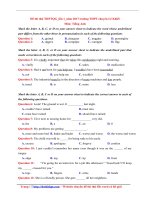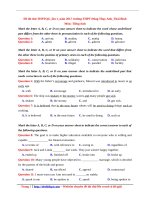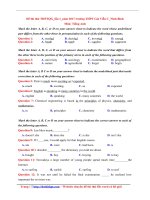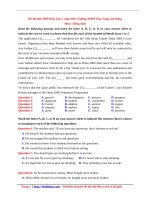- Trang chủ >>
- THPT Quốc Gia >>
- Ngoại Ngữ
de thi thu thptqgmon anhlan 2nam 2017 truong thpt huynh thuc khang file word co loi giai
Bạn đang xem bản rút gọn của tài liệu. Xem và tải ngay bản đầy đủ của tài liệu tại đây (143.17 KB, 17 trang )
Đề thi thử THPTQG_lần 2_năm 2017 trường THPT Huỳnh Thúc Kháng
Môn: Tiếng anh
Choose the word whose underlined part is pronounced differently from that of the others.
Question 1:
Question 2:
A. lie
A. finished
B. goalie
B. jagged
C. society
C. packed
D. pie
D. punched
Choose the word with the stress pattern different from that of the other three words in each
question.
Question 3:
Question 4:
A. different
A. individual
B. tradition
C. opera
B. unemployment C. difficult
D. capital
D. population
Mark the letter A, B, C, or D on your answer sheet to indicate the correct answer to each of
the following questions.
Question 5: Bob has a bad lung cancer and his doctor has advised him to.......smoking.
A. put up
B. take up
C. give up
D. turn up
Question 6: By this time next summer, you.......your study.
A. completes
B. will complete
C. are completing
D. will have completed
C. a lots of
D. a lot of
Question 7: He has........money in the bank.
A. a large number of
B. lot of
Question 8: To attract the guests’ attentions at the party, a polite MC on first appearance may
say.......
A. Good evening my slaves
B. Good night every body
C. Ladies and gentlemen
D. Hey, everybody! Shut up now!
Question 9: The teacher told her to.......her socializing because it was affecting her
schoolwork.
A. cut down on
B. put up with
C. run out of
D. look forward to
Question 10: It is said that he......learning English for nearly one year.
A. has been stopping
B. has been stopped
C. stopped
D. has stopped
Question 11: It looked dark and heavy.......it was going to rain.
A. as if
B. unless
C. whereas
D. although
Question 12: His........son will go to school this fall.
A. five-year-old
B. five years old
C. five years’ old
D. five-years-old
Question 13: No sooner had we left the house......it started snowing.
A. when
B. that
C. than
D. and
Trang 1 – Website chuyên đề thi thử file word có lời giải
Question 14: An endangered species is a species.......is so small that it is in danger of
extinction.
A. who
B. whose
C. what
D. which
Question 15: Had they arrived at the fair earlier, they.....what they wanted.
A. would have found
B. found
C. have found
D. had found
Question 16: The more you talk about the situation, .......
A. it seems worse
B. it seems the worse
C. the worse it seems
D. the worse does it seem
Mark the letter A, B, C, or D to indicate the word or phrase that is CLOSEST in
meaning to the underlined part in each of the following sentences.
Question 17: If the headmaster were here, he would sign your papers immediately.
A. currently
B. right away
C. formerly
D. right ahead
Question 18: Few businesses are flourishing in the present economic climate.
A. taking off
B. closing down
C. growing well
D. setting up
Mark the letter A, B, C, or D to indicate the word or phrase that is OPPOSITE in
meaning to the underlined part in each of the following sentences.
Question 19: Susan lost her head when she suddenly woke up and saw the house on fire.
A. took her breath away.
B. kept her head
C. kicked herself
D. changed her tune
Question 20: If you are at a loose end this weekend, I will show you round the city.
A. occupied
B. reluctant
C. free
D. confident
Mark the letter A, B, C, or D on your answer sheet to indicate the most suitable
response to complete each of the following questions.
Question 21: Miu Le: "I’m sorry I’m late." Tam Vy: "........."
A. Never mind. Go ahead
B. Don’t say so again.
C. No worries. Come in, please.
D. Good to hear that
Question 22: The teacher asked students to discuss the situation: "Which is better,
supermarkets or traditional markets?"
Jennifer: "I believe that supermarkets are much better than traditional markets."
Katherine: "........Each has its own features."
A. I can't help thinking the same.
B. I couldn't agree with you more.
Trang 2 – Website chuyên đề thi thử file word có lời giải
C. I disagree with you.
D. That's completely true.
Mark the letter A,B,C,or D to indicate the underlined part that needs correction in each
of the following questions.
Question 23: Among the world’s 44 richest countries, there has been not war since 1945.
A. been not
B. there
C. world’s
D. richest
Question 24: If either of you take a vacation now, we won’t be able to finish this work.
A. take
B. won’t be able
C. to finish
D. either
Question 25: What we know about certain diseases are still not sufficient to prevent them
from spreading easily among the population.
A. from spreading
B. among
C. What we know about D. are
Mark the letter A, B, C, or D on your answer sheet to indicate the sentence which is closest
in meaning to the original one.
Question 26: You can refuse to answer my question in no way.
A. In no way you can refuse to answer my question.
B. In no way can you refuse to answer my question.
C. In no way you refuse to answer my question.
D. In no way do you refuse to answer my question.
Question 27: People believe that he is a kind doctor.
A. He is loved by people because he is a kind doctor.
B. Everybody admires him because he is a kind doctor.
C. He is believed to be a kind doctor.
D. He is really a kind doctor.
Question 28: We lost the game because of my mistakes.
A. Although I made mistakes, we didn’t lose the game.
B. Despite my mistakes, we didn’t lose the game.
C. I made mistakes but we lost the game.
D. If I hadn’t made mistakes, we wouldn’t have lost the game.
Mark the letter A, B, C, or D on your answer sheet that best combines each pair of
sentences in the following questions.
Question 29: They're my two sisters. They aren't teachers like me.
A. Like me, neither of my two sisters aren't teachers.
Trang 3 – Website chuyên đề thi thử file word có lời giải
B. They're my two sisters, neither of whom are teachers like me.
C. They're my two sisters, both of those are teachers like me.
D. They're my two sisters who neither are teachers like me.
Question 30: I did not read his book. I did not understand what the lecturer was saying.
A. I found it very difficult to understand what the lecturer said in his book.
B. I would have understood what the lecturer was saying if I had read his book.
C. What the lecturer wrote and said was too difficult for me to understand.
D. The lecturer's book which I had not read was difficult to understand.
Read the following passage and mark the letter A, B, C, or D on your answer sheet to
indicate the correct word for each of the blanks:
There is usually one important subject missing from most school timetables. Very few
students are .....(1)........ how to organize their learning, and how to make the best use of their
time. Let’s take some simple examples. Do you know how to .....(2)... up words in a
dictionary, and do you understand all the information the dictionary contains? Can you ...(3)...
notes quickly, and can you understand them afterwards? For some reason, many schools give
learners no help with these matters. Teachers ask students to ...(4)... pages from books, or tell
them to write ten pages, but don't explain how to do it Learning by heart can be useful, but it
is important to have a genuine understanding of a subject. You can ...(5)... a lot of time
memorizing books, without understanding anything about the subject.
Question 31:
Question 32:
Question 33:
Question 34:
Question 35:
A. taught
A. get
A. revise
A. forget
A. pass
B. graduated
B. research
B. make
B. memorize
B. waste
C. learned
C. find
C. send
C. remind
C. use
D. educated
D. look
D. do
D. concentrate
D. tell
Read the following passage and mark the letter A, B, C, or D on your answer sheet to
indicate the correct answer to each of the questions:
According to airline industry statistics, almost 90 percent of airline accidents are survivable
or partially survivable. But passengers can increase their chances of survival by learning and
following certain tips. Experts say that you should read and listen to safety instructions before
take-off and ask questions if you have uncertainties. You should fasten your seat belt low on
your hips and as tightly as possible. Of course, you should also know how the release
mechanism of your belt operates. During take-off and landings you are advised to keep your
feet flat on the floor.
Trang 4 – Website chuyên đề thi thử file word có lời giải
Before take-off you should locate the nearest exit and an alternative exit and count the rows
of seat between you and the exits so that you can find them in the dark if necessary. In the
event that you are forewarned of the possible accident, you should put your hands on your
ankles and keep your head down until the plane come to complete stop. If smoke is present in
the cabin, you should keep your head low and cover your face with napkins, towels, or
clothing. If possible, wet these for added protection against smoke inhalation. To evacuate as
quickly as possible, follow crew command and do not take personal belongings with you. Do
not jump on escape slides before they are fully inflated and when you jump, do so with your
arms and legs extended in front of you. When you get to the ground, you should move away
from the plane as quickly as possible, and never smoke near the wreckage.
Question 36: What is the main topic of the passage?
A. Safety instructions in air travel.
B. Guidelines for increasing aircraft passengers survival.
C. Procedures for evacuating aircraft
D. Airline industry accident statistics.
Question 37: The word "evacuate" in the second paragraph is closest in meaning to........
A. maintain
B. escape
C. vacate
D. return
Question 38: According to the passage, airline travellers should keep their feet flat on the
floor.......
A. during take-off and landings
B. throughout the flight
C. especially during landings
D. only if an accident is possible
Question 39: Airline passenger are to do all of the following EXCEPT.......
A. ask questions about safety
B. carry personal belongings in an emergency
C. fasten their seat belt before take-off
D. locate the nearest exit
Question 40: Travellers are urged by experts to read and listen to safety instructions........
A. before locating the exits
B. in an emergency
C. if smoke is in the cabin
D. before take-off
Question 41: The word "inflated" in the second paragraph is closest in meaning to.......
A. lifted
B. assembled
C. increased
D. expanded
Question 42: According to the passage, which exits should an airline passenger locate before
take-off?
A. The two closest to the passenger's seat.
B. The ones that can be found in the dark.
C. The nearest one.
Trang 5 – Website chuyên đề thi thử file word có lời giải
D. The ones with counted rows of seats between them.
Read the following passage and mark the letter A, B, C, or D on your answer sheet to
indicate the correct answer to each of the questions from 43 to 50
After inventing dynamite, Swedish-born Alfred Nobel became a very rich man. However, he
foresaw its universally destructive powers too late. Nobel preferred not to be remembered as
the inventor of dynamite, so in 1895, just two weeks before his death, he created a fund to be
used for awarding prizes to people who had made worthwhile contributions to humanity.
Originally, there were five awards: literature, physics, chemistry, medicine, and peace.
Economics was added in 1968, just sixty-seven years after the first awards ceremony.
Nobel's original legacy of nine million dollars was invested, and the interest on this sum is
used for the awards which vary from $30,000 to $125,000.
Every year on December 10, the Anniversary of Nobel's death, the awards (gold medal,
illuminated diploma, and money) are presented to the winners. Sometimes politics plays an
important role in the judges' decisions. Americans have won numerous science awards, but
relatively few literature prizes. No awards were presented from 1940 to 1942 at the beginning
of World War II. Some people have won two prizes, but this is rare; others have shared their
prizes.
Question 43: What is the main idea of this passage?
A. Alfred Nobel created awards in six categories for contributions to humanity.
B. Alfred Nobel made a lasting contribution to humanity
C. Alfred Nobel became very rich when he invented dynamite.
D. Alfred Nobel left all of his money to science
Question 44: The word "foresaw" in the first paragraph is nearest in meaning to.......
A. predicted
B. postponed
C. prevented
D. prevailed
Question 45: All of the following statements are true EXCEPT......
A. A few individuals have won two awards.
B. Ceremonies are held on December 10 to commemorate Nobel's invention.
C. Awards vary in monetary value.
D. Politics plays an important role in selecting the winners.
Question 46: In which area have Americans received the most awards?
A. Science
B. Peace
C. Economics
D. Literature
Question 47: It is implied that Nobel's profession was in.......
A. medicine
B. literature
C. science
D. economics
Trang 6 – Website chuyên đề thi thử file word có lời giải
Question 48: In the first paragraph, "worthwhile" is closest in meaning to........
A. trivial
B. prestigious
C. economic
D. valuable
Question 49: The Nobel prize was established in order to.......
A. resolve political differences
B. spend money
C. recognize worthwhile contributions to humanity
D. honor the inventor of dynamite
Question 50: The word "legacy" in the second paragraph means most nearly the same
as........
A. bequest
B. debt
C. prize
D. legend
Trang 7 – Website chuyên đề thi thử file word có lời giải
Đáp án
1-B
11-A
21-C
31-A
41-D
2-B
12-A
22-C
32-D
42-A
3-B
13-A
23-A
33-B
43-B
4-C
14-D
24-A
34-B
44-A
5-C
15-A
25-D
35-B
45-B
6-D
16-C
26-B
36-B
46-A
7-D
17-B
27-C
37-B
47-C
8-C
18-C
28-D
38-A
48-D
9-A
19-B
29-B
39-B
49-C
LỜI GIẢI CHI TIẾT
Question 1: Đáp án B
goalie, phát âm là /ɪ/ , còn lại phát âm là /aɪ/
A. lie /laɪ/ (v) nói dối
B. goalie /ˈɡoʊli/ (n) thủ mơn
C. society /səˈsaɪəti/ (n) xã hội
D. pie /paɪ/ (n) bánh táo
Question 2: Đáp án B
jagged, phát âm là /ɪd/, còn lại phát âm là /t/
A. finished /ˈfɪnɪʃt/ (v) hoàn thành
B. jagged /ˈdʒæɡɪd/ (adj) răng cưa, lởm chởm
C. packed /pækt/ (adj) đầy
D. punched /pʌntʃt/ (v) đấm
Question 3: Đáp án B
tradition, trọng âm âm tiết thứ hai, còn lại âm tiết thứ nhất.
A. different /ˈdɪfrənt/ (adj) khác biệt
B. tradition /trəˈdɪʃn/ (n) truyền thống
C. opera /ˈɑːprə/ (n) hịa nhạc
D. capital /ˈkỉpɪtl/ (n) thủ đơ
Question 4: Đáp án C
difficult, trọng âm âm tiết thứ nhất, còn lại âm tiết thứ ba
A. individual /ˌɪndɪˈvɪdʒuəl/ (n) cá nhân
B. unemployment /ˌʌnɪmˈplɔɪmənt/ (n) sự thất nghiệp
C. difficult /ˈdɪfɪkəlt/(adj) khó khăn
D. population /ˌpɑːpjuˈleɪʃn/ (n) dân số
Question 5: Đáp án C
Giải thích: Give up doing sth: ngừng làm việc gì.
A. put up: chịu đựng
Trang 8 – Website chuyên đề thi thử file word có lời giải
10-A
20-A
30-B
40-D
50-A
B. take up: đảm nhận
D. turn up: trở nên
Dịch nghĩa: Bob bị ung thư phổi và bác sĩ của anh ta đã khuyên anh ta bỏ thuốc lá.
Question 6: Đáp án D
Giải thích: Dùng thì tương lai hồn thành vì dấu hiệu “by this time next summer”
Dịch nghĩa: Vào thời điểm này vào mùa hè tới, bạn sẽ hoàn thành nghiên cứu của bạn.
Question 7: Đáp án D
A. a large number of: theo sau là danh từ số nhiều đếm được
B. lot of: sai từ kết hợp
C. a lots of: sai từ kết hợp
D. a lot of: nhiều
Dịch nghĩa: Anh ta có rất nhiều tiền trong ngân hàng.
Question 8: Đáp án C
Giải thích: Khi bắt đầu một sự kiện, người ta thường nói: “Ladies and gentlemen!” Thưa các
q ơng q bà!
Dịch nghĩa: Để thu hút sự chú ý của khách hàng trong bữa tiệc, một MC lịch sự trong màn
xuất hiện lần đầu có thể nói: Thưa quý vị!
Question 9: Đáp án A
A. cut down on: giảm đi
B. put up with: chịu đựng
C. run out of: hết
D. look forward to: trơng mong
Dịch nghĩa: Giáo viên nói với cơ ấy giảm hoạt động xã hội bởi vì nó đã ảnh hưởng đến việc
học tập của cơ.
Question 10: Đáp án A
Giải thích: Dùng thì Hiện tại hồn thành tiếp diễn diễn tả hành động đã xảy ra ở quá khứ,
hiện tại và có thể xảy ra ở tương lai, nhấn mạnh hành động đang tiếp diễn. Thì Hiện taị Hồn
thành là ưu tiên số hai trong trường hợp này (đáp án D)
Dịch nghĩa: Người ta nói rằng anh ta đã ngừng học tiếng Anh trong gần một năm.
Question 11: Đáp án A
Giải thích: Giả định trong quá khứbr> Dịch nghĩa: Trời đã có vẻ tối và nặng như thể sắp mưa.
Question 12: Đáp án A
Giải thích: “five-year-old” đóng vai trị là tính từ thì các từ giữ ngun (khơng thêm –s)br>
Dịch nghĩa: Đứa con trai năm tuổi của ông sẽ đi học vào mùa thu này.
Trang 9 – Website chuyên đề thi thử file word có lời giải
Question 13: Đáp án A
Giải thích: Cấu trúc: No sooner ... when ...: vừa mới
Dịch nghĩa: Chúng tôi vừa mới rời khỏi nhà khi tuyết bắt đầu rơi.
Question 14: Đáp án D
Giải thích: Mệnh đề quan hệ chỉ vật ta dùng “which”
Dịch nghĩa: Một loài nguy cấp là một loài rất nhỏ mà nó đang có nguy cơ tuyệt chủng.
Question 15: Đáp án A
Giải thích: Câu điều kiện loại III: sử dụng S + would + have + P(ii) sau mệnh đề “if” hoặc
mệnh đề đảo ngữ của “if”
Dịch nghĩa: Nếu họ đến hội chợ sớm hơn, họ sẽ đã tìm thấy thứ họ muốn.
Question 16: Đáp án C
Giải thích: Cấu trúc so sánh đồng tiến: The + SS hơn + Mệnh đề, The + SS hơn + Mệnh đề.
Dịch nghĩa: Bạn càng nói về tình huống càng nhiều, thì càng tệ hại hơn
Question 17: Đáp án B
Giải thích: immediately: ngay lập tức
A. currently: hiện tại, hiện hành
B. right away: ngay lập tức
C. formerly: trước đây
D. right ahead: trước mặt
Dịch nghĩa: Nếu hiệu trưởng ở đây, ông ta sẽ ký giấy tờ của bạn ngay.
Question 18: Đáp án C
Flourishing: nở rộ, phát triển tốt
A. taking off: cởi ra
B. closing down: đóng cửa
C. growing well: phát triển tốt
D. setting up: bắt đầu, thành lập
Dịch nghĩa: Rất ít doanh nghiệp đang phát triển mạnh trong điều kiện kinh tế hiện nay.
Question 19: Đáp án B
Giải thích: Lose sb’s head: mất bình tĩnh, mất kiểm soát
A. took her breath away: làm ngạc nhiên, kinh ngạc
B. kept her head: giữ bình tĩnh
C. kicked herself: tự đá mình
D. changed her tune: thay đổi giọng điệu, thái độ
Dịch nghĩa: Susan mất kiểm sốt khi cơ đột nhiên tỉnh dậy và thấy căn nhà cháy.
Trang 10 – Website chuyên đề thi thử file word có lời giải
Question 20: Đáp án A
Giải thích: at a loose end: nhàn rỗi, vô công dồi nghề
A. occupied: bận rộn
B. reluctant: bắt buộc
C. free: tự do
D. confident: tự tin
Dịch nghĩa: Nếu bạn nhàn rỗi cuối tuần này, tôi sẽ cho đưa bạn quanh thành phố.
Question 21: Đáp án C
Giải thích: Cần một câu đáp lại lời xin lỗi. Chọn C
A. Never mind. Go ahead: không sao cả, cứ tự nhiên (mang tính khách sáo)
B. Don’t say so again: đừng nói như vậy lại nữa.
C. No worries. Come in, please: Đừng bận lòng, cứ vào đi.
D. Good to hear that: thật tốt khi nghe thấy điều đó
Dịch nghĩa Miu Le: "Xin lỗi em đến muộn." Tam Vy: "Đừng lo lắng, cứ vào đi"
Question 22: Đáp án C
Giải thích: Câu nói thứ hai cần là thái độ phản đối ý kiến của câu nói thứ nhất
A. I can't help thinking the same: Tơi không chịu được việc nghĩ giống thế (đồng ý)
B. I couldn't agree with you more: Tôi không thể đống ý với bạn nhiều hơn nữa (Đồng ý)
C. I disagree with you: Tôi không đồng ý với bạn
D. That's completely true: Điều đó hồn tồn đúng (hồn tồn đồng ý) Dịch nghĩa: Giáo viên
yêu cầu học sinh thảo luận về tình huống: "Cái nào là tốt hơn, siêu thị hoặc các chợ truyền
thống?"
Jennifer: "Tôi tin rằng các siêu thị sẽ tốt hơn nhiều so với các chợ phiên truyền thống."
Katherine: "Tôi khơng đồng ý với bạn. Mỗi thứ có những đặc điểm riêng của nó."
Question 23: Đáp án A
been not => not been
Giải thích: “not” phải đứng sau từ “have/has”
Dịch nghĩa: Trong số 44 nước giàu nhất thế giới, khơng có chiến tranh từ năm 1945.
Question 24: Đáp án A
take => takes
Giải thích: Sau “either of + N” hay “neither of + N” và động từ chia ở dạng số ít.
Dịch nghĩa: Nếu một trong hai bạn nghỉ phép bây giờ, chúng tơi sẽ khơng thể hồn thành tác
phẩm này.
Question 25: Đáp án D
Trang 11 – Website chuyên đề thi thử file word có lời giải
are => is
Giải thích: Cả mệnh đề “What we know about certain diseases” làm chủ ngữ nên ta chia động
từ số ít.
Dịch nghĩa: Những gì chúng ta biết về một số bệnh vẫn chưa đủ để ngăn chúng lây lan dễ
dàng trong dân số.
Question 26: Đáp án B
Giải thích: In no way + đảo ngữ: khơng cịn cách nào ...
Dịch nghĩa: Bạn có thể từ chối trả lời câu hỏi của tơi khơng có cách nào.
Question 27: Đáp án C
Giải thích: Câu bị động đặc biệt (hai mệnh đề) ở dạng Hiện tại_hiện tại : S + tobe + P(ii) + to
V
Dịch nghĩa: Mọi người tin rằng ông là một bác sĩ tốt bụng.
A. Ơng ta được u bởi vì ông ta là một bác sĩ tốt bụng.
B. Tất cả mọi người ngưỡng mộ ơng ta bởi vì ơng ta là một bác sĩ tốt bụng.
C. Ông ta được tin là một bác sĩ tốt bụng
D. Anh ta thực sự là một bác sĩ tốt bụng.
Question 28: Đáp án D
Giải thích: Sử dụng câu điều kiện loại III
Dịch nghĩa: Chúng tơi đã thua trận đấu vì những sai lầm của tôi.
A. Mặc dù tôi đã mắc sai lầm, nhưng chúng tơi đã khơng thua cuộc.
B. Mặc dù vì sai lầm của tôi, chúng tôi đã không thua cuộc.
C. Tôi đã sai lầm nhưng chúng tôi đã thua cuộc.
D. Nếu tôi không mắc sai lầm, chúng tôi sẽ đã không thua trận đấu.
Question 29: Đáp án B
Giải thích: Đáp án A sai nghĩa, đáp án C D sai cấu trúc ngữ pháp. Chọn B Dịch nghĩa: Họ là
hai chị em của tôi. Họ không phải là giáo viên như tôi.
A. Giống như tôi, cả hai chị em tôi đều không phải là giáo viên.
B. Họ là hai chị em của tôi, không ai trong số họ là giáo viên như tôi.
C. Họ là hai chị em của tôi, cả hai đều là những giáo viên như tôi.
D. Họ là hai chị em của tôi người mà không phải là những giáo viên như tơi
Question 30: Đáp án B
Giải thích: Dùng câu điều kiện III, về hành động xảy ra trong quá khứ. Dịch nghĩa: Tôi đã
không đọc cuốn sách của ông ấy. Tơi khơng hiểu những gì giảng viên đã nói.
A. Tơi thấy rất khó để hiểu được những gì giảng viên đã nói trong cuốn sách của ơng.
Trang 12 – Website chuyên đề thi thử file word có lời giải
B. Tơi đã có thể hiểu những gì các giảng viên đã nói nếu tơi đã đọc cuốn sách của mình.
C. Các bài giảng đã viết và nói là q khó cho tơi để hiểu.
D. Cuốn sách của giảng viên mà tơi đã khơng đọc thì rất là khó hiểu.
Question 31: Đáp án A
taught
Giải thích: Rất ít sinh viên được dạy cách sắp xếp việc học => Be taught how to do sth: được
dạy làm gì
A. taught: dạy
B. graduated: tốt nghiệp
C. learned: học
D. educated: giáo dục.
Question 32: Đáp án D
Look up: tra từ
A. get: nhận lấy
B. research: nghiên cứu
C. find: tìm kiếm
Question 33: Đáp án B
Make notes = take notes: ghi chú
A. revise: ôn tập
C. send: gửi
D. do: làm
Question 34: Đáp án B
A. forget: quên
B. memorize: ghi nhớ
C. remind: nhắc nhở
D. concentrate: tập trung
Question 35: Đáp án B
waste
Giải thích: waste time doing sth: lãng phí thời gian làm gì
A. pass: trơi qua
C. use: sử dụng
D. tell: nói
Question 36: Đáp án B
Trang 13 – Website chuyên đề thi thử file word có lời giải
Giải thích: Thơng tin nằm ở câu chủ đề: “But passengers can increase their chances of
survival by learning and following certain tips.” Dịch nghĩa: Chủ đề chính của đoạn này là
gì?
A. Hướng dẫn an tồn trong chuyến đi hàng khơng.
B. Hướng dẫn tăng sự sống sót của các hành khách máy bay.
C. Thủ tục di tản máy bay.
D. Số liệu thống kê tai nạn lao động ngành hàng không
Question 37: Đáp án B
Giải thích: evacuate: sơ tán, giải cứu
Dịch nghĩa: Từ " evacuate " trong đoạn thứ hai có ý nghĩa gần nhất với ........
A. duy trì
B. trốn thốt
C. bỏ lại
D. quay trở lại
Question 38: Đáp án A
Giải thích: Thơng tin nằm ở: “During take-off and landings you are advised to keep your feet
flat on the floor.”
Dịch nghĩa: Theo đoạn văn này, hanfh khách trên không nên giữ chân trên sàn nhà .......
A. Trong khi cất cánh và hạ cánh
B. trong suốt chuyến bay
C. đặc biệt là khi đổ bộ
D. chỉ khi xảy ra tai nạn
Question 39: Đáp án B
Giải thích: Thơng tin nằm ở: “To evacuate as quickly as possible, follow crew command and
do not take personal belongings with you.”
Dịch nghĩa: Hành khách đường hàng không phải làm tất cả những điều sau đây ngoại trừ .......
A. đặt câu hỏi về sự an toàn
B. mang đồ đạc cá nhân trong trường hợp khẩn cấp
C. buộc dây an toàn trước khi cất cánh
D. xác định vị trí lối ra gần nhất
Question 40: Đáp án D
Giải thích: Thơng tin nằm ở: “Experts say that you should read and listen to safety
instructions before take-off and ask questions if you have uncertainties”
Dịch nghĩa: Khách du lịch được các chuyên gia kêu gọi đọc và nghe hướng dẫn an toàn ........
Trang 14 – Website chuyên đề thi thử file word có lời giải
A. Trước khi xác định điểm xuất cảnh
B. trong trường hợp khẩn cấp
C. nếu khói là trong cabin
D. trước khi cất cánh
Question 41: Đáp án D
Dịch nghĩa: Từ " inflated " trong đoạn thứ hai là gần nghĩa nhất với .......
A. lifted: nâng, nhấc
B. assembled: thu thập
C. increased: gia tăng
D. expanded: mở rộng
Question 42: Đáp án A
Giải thích: Thơng tin nằm ở: “Before take-off you should locate the nearest exit and an
alternative exit and count the rows of seat between you and the exits so that you can find
them in the dark if necessary” Dịch nghĩa: Theo đoạn văn, điều gì hành khách nên định vị
được trước khi cất cánh?
A. Hai chiếc gần chỗ ngồi của hành khách nhất.
B. Các chất có thể được tìm thấy trong bóng tối.
C. một trong những gần nhất.
D. những người có đếm hàng ghế giữa họ.
Question 43: Đáp án B
Giải thích: Nội dung bài văn nói về những đóng góp của Nobel dành cho nhân loại.
Dịch nghĩa: Ý chính của đoạn văn này là gì?
A. Alfred Nobel đã tạo ra các giải thưởng trong sáu loại cho những đóng góp cho nhân loại.
B. Alfred Nobel đã đóng góp lâu dài cho nhân loại
C. Alfred Nobel trở nên rất giàu có khi phát minh ra chất nổ.
D. Alfred Nobel đã để lại tất cả tiền của mình cho khoa học
Question 44: Đáp án A
Giải thích: foresaw: (foresee): nhìn thấy trước
A. predicted: dự đốn
B. postponed: trì hoãn
C. prevented: ngăn cản
D. prevailed: thắng thế
Dịch nghĩa: Từ "foresaw" trong đoạn đầu tiên gần nhất có nghĩa là .......
Question 45: Đáp án B
Trang 15 – Website chuyên đề thi thử file word có lời giải
Giải thích: Thơng tin nằm ở: “Every year on December 10, the Anniversary of Nobel's death,
the awards (gold medal, illuminated diploma, and money) are presented to the winners.”
Dịch nghĩa: Tất cả các tuyên bố sau đây là đúng ngoại trừ .......
A. Một vài cá nhân đã giành được hai giải thưởng.
B. Các buổi lễ được tổ chức vào ngày 10 tháng 12 để kỷ niệm phát minh của Nobel.
C. Các giải thưởng khác nhau về giá trị tiền tệ.
D. Chính trị đóng một vai trị quan trọng trong việc lựa chọn người chiến thắng.
Question 46: Đáp án A
Giải thích: Thơng tin nằm ở: “Americans have won numerous science awards, but relatively
few literature prizes”
Dịch nghĩa: Trong khu vực nào mà người Mỹ đã nhận được nhiều giải thưởng nhất?
A. Khoa học
B. Hịa bình
C. Kinh tế
D. Văn học
Question 47: Đáp án C
Giải thích: Thơng tin nằm ở: “After inventing dynamite, Swedish-born Alfred Nobel became
a very rich man. However, he foresaw its universally destructive powers too late.” Ta thấy
Nobel phát minh ra thuốc nổ nên đốn được ngụ ý chỉ ơng là một nhà khoa học.
Dịch nghĩa: Người ta ngụ ý rằng nghề của Nobel về .......
A. y học
B. văn học
C. khoa học
D. kinh tế học
Question 48: Đáp án D
Giải thích: Worthwhile: giá trị, đáng giá
Dịch nghĩa: Trong đoạn đầu tiên, " worthwhile " có nghĩa gần nhất là ........
A. trivial: khơng đáng kể
B. prestigious: uy tín
C. economic: thuộc về kinh tế
D. valuable: giá trị
Question 49: Đáp án C
Giải thích: Thơng tin nằm ở: “Every year on December 10, the Anniversary of Nobel's death,
the awards (gold medal, illuminated diploma, and money) are presented to the winners.”
Trang 16 – Website chuyên đề thi thử file word có lời giải
Dịch nghĩa: Giải thưởng Nobel được thành lập để
A. Giải quyết sự khác biệt chính trị
B. tiêu tiền
C. nhận biết những đóng góp đáng giá cho nhân loại
D. vinh danh người phát minh ra chất nổ
Question 50: Đáp án A
Giải thích: legacy: di sản
Dịch nghĩa: Từ " legacy " ở đoạn thứ hai có nghĩa gần giống như ........
A. bequest: sự thừa kế
B. debt: nợ nần
C. prize: giải thưởng
D. legend: huyền thoại
Trang 17 – Website chuyên đề thi thử file word có lời giải
